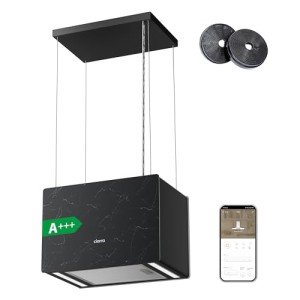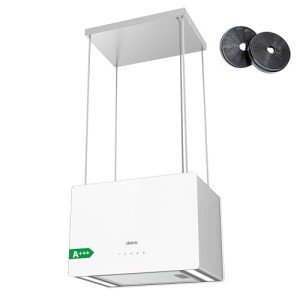This Week's Top Stories Concerning Island Extractor
페이지 정보

본문
Kitchen Island Extractor Fan: The Essential Guide to Choosing and Installing
A kitchen island extractor fan is a typically neglected however necessary part of contemporary kitchen design. Developed to eliminate smoke, odors, and moisture from the air, these appliances not just improve indoor air quality but likewise add an aesthetic interest kitchen island cooker hood spaces. This article offers an extensive guide to kitchen island extractor fans, detailing their types, benefits, setup considerations, and maintenance tips.

Understanding Kitchen Island Extractor Fans
Kitchen island extractor fans, also known as downdraft extractors, are ventilators particularly developed to be set up above kitchen islands. Unlike standard wall-mounted or ceiling-mounted range hoods, these fans come down from an island, successfully drawing cooking vapors straight away from the cooking surface area. They are particularly appealing in open-plan layouts, where exposure and style cohesiveness are critical.

Benefits of Kitchen Island Extractor Fans
- Improved Air Quality: These extractors successfully eliminate undesirable particles, smoke, and odors, promoting a healthier kitchen environment.
- Visual Appeal: Island extractors are streamlined and modern-day, providing a stylish focal point in kitchen style.
- Space Efficiency: kitchen island extractor Fan They do not protrude outside like traditional hoods, making them perfect for kitchens with limited vertical area.
- Flexible Cooking Arrangement: With an island extractor, house owners can place their cooktops on islands without compromising ventilation.
- Sound Reduction: Many modern extractor fans are created to run silently, enhancing the cooking experience.
Types of Kitchen Island Extractor Fans
Kitchen island ventilation hoods extractor fans can be categorized based on their installation method and functionality. Below are some common types:
| Type of Extractor Fan | Description |
|---|---|
| Downdraft Extractors | Retractable fans that rise from the countertop or island when required. |
| Canopy Hoods | Smooth styles that set up directly above the cooking location and vent upwards. |
| Chimney Hoods | Extend from the wall or ceiling and normally draw air through a duct system. |
| Ductless Models | Use filters to clean the air and recirculate it back to the kitchen. |
Picking the Right Kitchen Island Extractor Fan
When choosing an extractor fan for a kitchen island, numerous aspects must be considered:
Suction Power: Measured in cubic feet per minute (CFM), suction power need to be proportionate to the cooking surface area. A common suggestion is the following:
- For gas cooktops: 100 CFM per 10,000 BTUs (British Thermal Units).
- For electric cooktops: 300 CFM for an electric range.
Style: Choose a style that matches your kitchen looks. Think about the material, surface, and kitchen island extractor fan overall style of your kitchen.
Setup Space: Ensure the size of the extractor fits within the available area. Check the kitchen island's measurements and design.
Sound Level: Look for models with lower sones (a step of sound); preferably, listed below 55 sones for a quieter operation.
Maintenance: Consider ease of cleaning and filter replacement. Some designs provide detachable and dishwasher-safe parts.
Installation Considerations
Installing a kitchen island extractor hood island extractor fan involves a number of essential factors to consider:
- Ducting Requirements: Many extractors need direct ducting to the outside. This might involve modifications to existing structures and can be more complicated based upon ceiling height and layout.
- Electrical Considerations: Ensure that the setup abides by electrical codes. A certified electrician might be necessary for connecting power.
- Height of Installation: The fan's height ought to be above the cooking location for optimum functionality and security.
- Assessment and Professional Installation: Due to the intricacy of some installations, talking to a professional kitchen designer or specialist is advised.
Maintenance Tips for Kitchen Island Extractor Fans
To make sure durability and optimal efficiency, routine upkeep is important. Here are a few ideas:
- Clean Filters Regularly: Depending on use, filters need to be cleaned up or changed every 1-3 months. A lot of can be cleaned in the dishwasher.
- Dust and Debris Removal: Wipe down the outside of the fan and surrounding locations to avoid dust accumulation.
- Look for Blockages: Ensure that ducts are clear of blockages, as blockages can badly minimize efficiency.
- Expert Servicing: Consider expert maintenance every year to preserve optimum efficiency and safety.
FAQs
How do I understand what CFM appropriates for my kitchen?
- The recommended CFM is based on the kind of cooktop you have. For gas cooktops, it's about 100 CFM per 10,000 BTUs, while for electric, a minimum of 300 CFM is suggested.
Are ductless extractor fans reliable?
- Yes, ductless extractor fans work for light cooking, using filters to recirculate the air. However, for heavy cooking or high heat, ducted systems are suggested.
Can an island extractor fan be installed in a low ceiling?
- Yes, there are designs specifically created for lower ceilings, including downdraft extractors that can be hidden when not in usage.
How typically should I clean my extractor fan?
- Filters need to be cleaned or changed every 1-3 months, and the exterior can be cleaned down weekly.
Is it difficult to set up an island extractor fan?
- Installation can be difficult and typically needs ducting and electrical work, so employing a professional is suggested.
Choosing and maintaining a kitchen island extractor fan is necessary for accomplishing a practical and aesthetically pleasing kitchen. By comprehending the various types, benefits, and upkeep demands, house owners can make educated choices that enhance their cooking experiences. With the best extractor fan in location, cooking at home can be a more enjoyable and healthier endeavor.
In summary, whether you're designing a new kitchen or updating your existing setup, a kitchen island extractor fan (sneak a peek here) is a worthwhile financial investment that integrates performance with style.
- 이전글What You Should Be Focusing On Improving White Triple Bunk Bed 25.05.19
- 다음글15 Things You Didn't Know About Mitsubishi Lost Key Replacement 25.05.19
댓글목록
등록된 댓글이 없습니다.